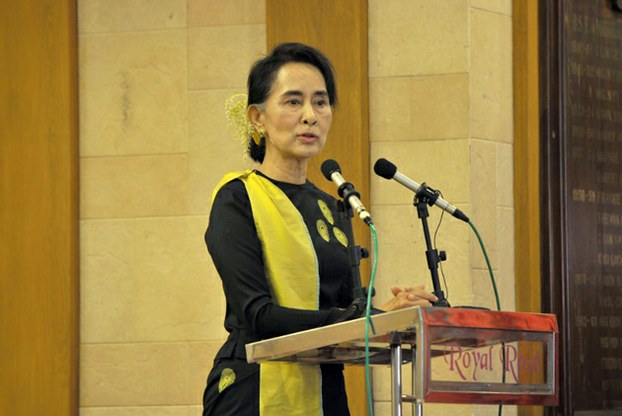




Burmese democracy icon Aung San Suu Kyi came under increasing criticism this week for failing to speak out on the plight of Myanmar’s persecuted Rohingya Muslim minority who are at the center of a regional refugee crisis, with friends voicing disappointment and former admirers blaming her silence on political concerns.
“It’s very sad,” Tibetan spiritual leader the Dalai Lama told the newspaper The Australian on Thursday, saying that he had met twice in the past with the democracy activist and fellow Nobel laureate, once in London and once in the Czech Republic.
“I mentioned about this problem and she told me she found some difficulties, that things were not simple but very complicated,” the Dalai Lama said.
“But in spite of that I feel she can do something,” he added.
Others, more openly critical, point to possible fears over the outcome of national elections scheduled for late October or early November in which Aung San Suu Kyi’s opposition National League for Democracy (NLD) hopes to gain more seats in Myanmar’s National Assembly.
By speaking out for the Rohingya, both Myanmar’s ruling, military-dominated Union Solidarity and Development Party (USDP) and the NLD could risk losing the support of the country’s majority-Buddhist voters, said David Steinberg, Distinguished Professor of Asian Studies Emeritus at Georgetown University.
“I think she is holding back because anything to do with recognizing the Rohingya, including even the name, is anathema before the election,” Steinberg said, adding, “It is a sorry state of affairs.”
Disputes over identity
Myanmar’s government refers to Rohingyas, who number around 1 million people in Rakhine state, as “Bengali” because it views them as illegal immigrants from Bangladesh, although many have lived in the country for generations.
So sensitive is the terminology issue that Myanmar initially refused to attend a meeting on Friday in Bangkok of envoys from 17 countries directly or indirectly affected by the growing “boat people” crisis on the Indian Ocean if the term Rohingya was to be used.
Htin Linn, the acting director of Myanmar's Foreign Affairs Ministry, did attend the meeting on “Irregular Migration in the Indian Ocean,” and used the occasion to warn other delegates that “finger pointing will not serve any purpose. It will take us nowhere."
Communal violence between Rohingya and ethnic Buddhists in Myanmar’s northwestern Rakhine state in 2012 left more than 200 dead and tens of thousands homeless, with the Rohingya bearing the brunt of the violence.
Deadly clashes erupted again two years later, prompting calls by rights groups and the United Nations for investigations into the unrest.
Helped by human traffickers, hundreds of Rohingya meanwhile began to flee Myanmar by boat for Malaysia, Thailand, and Indonesia, leading to a surge of illegal migration by Rohingya and Bangladeshis this month that saw countries in the region turning vessels filled with sick and hungry passengers, including women and children, back at sea.
Malaysian officials told reporters this week that in many cases the organizers of the trafficking rings were themselves Rohingyas from Myanmar.
Government to blame
Myanmar’s government is largely to blame for having failed to implement “a serious reconciliation plan” in the wake of the 2012 violence, John Sifton, Asia Advocacy Director for Human Rights Watch, told RFA’s English service.
But many around the world have also hoped that Aung San Suu Kyi, who was held for 12 years under house arrest by Myanmar’s former ruling military junta, would use “her political capital, her moral influence, to change the underlying dynamic of the political situation,” he said.
“Right now, it is routine for Burmese politicians, Burmese people in all walks of life, to say extremely reactionary and hateful things about the Rohingya population of Burma,” Sifton said.
"Nobody is standing up and saying, ‘No, this is not what democracy is, what modern pluralistic societies are like,” he added.
“Aung San Suu Kyi could have been that person, and she failed to do that.”
Attempts by RFA’s Burmese service to get a comment from Aung San Suu Kyi or her representatives were unsuccessful.